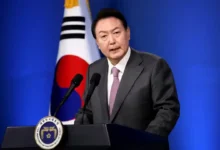Algeria protests: The beginning of the end?

Tens of thousands of Algerians have been protesting against 81-year-old President Abdelaziz Bouteflika’s decision to run for a fifth term on 18 April.
It is a rare show of dissent in the North African country, where more than 30 per cent of people aged fewer than 30 are unemployed.
Yes, they are the biggest protests against President Bouteflika since he came to power 20 years ago in elections that followed the country’s bloody civil war.
People have taken to the streets in various cities 10 days after his candidacy for the presidential election was confirmed.
The demonstrations are being organised on social media – and while the trigger has been Mr Bouteflika’s re-election bid, anger is also being expressed about perceived deep-rooted corruption among the ruling elite.
In particular, it is young people, who have not usually expressed an interest in Algeria’s party politics.
University students have joined in as well as lawyers.
Even journalists working at the public broadcaster took part in one protest. They denounced the censorship imposed by managers that has led to the protests not being covered on state TV and radio.
The protests have been growing in strength this week.
Only one opposition politician is so far taking advantage of the situation – Ali Benflis, a former prime minister and Mr Bouteflika’s fiercest rival, has been participating in the rallies.
Djamila Bouhired, a respected heroine of the independence war against former colonial power France, has also been seen with the protesters.
Tear gas has been fired during some protests, but Prime Minister Ahmed Ouyahia has praised the generally peaceful demonstrations, highlighting the moment when protesters offered roses to police officers.
But he warned that the uprising in Syria in 2011, which later descended into a brutal conflict, “started with exchanges of roses”.
The ruling coalition of the National Liberation Front (FLN) and the National Democratic Rally (RND) clearly did not expect such resistance to Mr Bouteflika’s bid for a fifth term.
They have until Sunday to review their choice of candidate and propose an alternative to the ailing Mr Bouteflika.
But this is not very likely to happen.
For nearly two decades, Mr Bouteflika’s government managed to maintain social stability thanks to soaring oil prices.
This enabled it to invest in huge infrastructure projects, like big housing estates with affordable homes and tram networks across the country. –BBC







